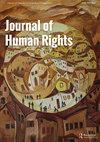Introduction to a symposium on political apologies
IF 1.6
2区 社会学
Q3 INTERNATIONAL RELATIONS
引用次数: 0
Abstract
World history has long confirmed Thucydides’ observation that “the strong do what they will and the weak suffer what they must.” Yet, starting more than a quarter century ago, the “strong” began to do something that powerful states had never done before—namely, apologizing to the “weak” for harms committed against them in the past. Although this was heralded as the Age of Apology, there was every reason to believe this would be a fleeting affair, best serving the inflated egos of “New Age” politicians such as Bill Clinton and Tony Blair. One obvious reason to question the staying power of political apologies was that this was contrary to literally centuries of state practice. Another reason, and perhaps a more practical one, was that the weak have no means to make the strong do anything, let alone apologize. Yet, just the opposite has taken place. Rather than dying a natural death and returning to a status quo in which powerful states answered to no one—not even to themselves—what has happened is that not only have political apologies become common but it is now the absence of a state apology that often will raise questions. Along with the rise of political apologies has been academic analysis of this phenomenon. It would not be possible to summarize anywhere near the scope of this scholarship. Still, one overriding question that serves as the underlying basis for so many of the books and articles that have been written on political apologies to date is this: Do political apologies really mean anything? Some scholars are of the mind that the veritable explosion in state apologies over the past few decades is evidence of a new international ethos, whereas others see little, if any, change in international relations and therefore conclude that many, if not all, political apologies are little more than cynical political ploys dressed up in high-sounding language purely for domestic consumption. Of course, it is possible that both points of view are correct. What follows are three articles that were presented at the online workshop, “Political Apologies for Historical Wrongs,” hosted by the University of Aberdeen in February 2021, which brought together some of the leading authorities on state apologies. In addition to the outstanding scholarship on display, one of the more useful aspects of these articles is how differently they approach this subject. Given their ubiquity, one of the problems in studying political apologies has simply been keeping track of them. Of course, some apologies are given with great fanfare and ceremony, but others are done more in the shadows, perhaps reflecting the degree of sincerity with which the apology is being given. For decades, Rhoda Howard-Hassmann performed the unenviable job of constructing and maintaining a public website cataloging all (known) state apologies. This task has now been handed over to Juliette Schaafsma, Marieke Zoodsma, Thia Sagherian-Dickey, and others at Tilburg University and is described more fully in the article, “Closing Chapters of the Past? Rhetorical Strategies in Political Apologies for Human Rights Violations across the World.” One of the things that is so groundbreaking about this work is the global perspective it provides. As the authors point out, most work in this area has been case based, meaning a particular政治道歉专题讨论会介绍
世界历史早已证实了修昔底德的一句话:“强者为所欲为,弱者自食其果。”然而,从25年前开始,“强国”开始做一些强国从未做过的事情——即为过去对“弱国”造成的伤害向“弱国”道歉。尽管这被称为“道歉的时代”,但我们有充分的理由相信,这将是一个短暂的事件,最能满足比尔•克林顿(Bill Clinton)和托尼•布莱尔(Tony Blair)等“新时代”政客膨胀的自我。质疑政治道歉的持久力的一个明显理由是,这与几个世纪以来的国家实践背道而驰。另一个原因,也许是一个更实际的原因,是弱者没有办法让强者做任何事,更不用说道歉了。然而,事实却恰恰相反。而不是自然死亡,回到一个强大的国家对任何人都不回应的现状——甚至对自己也不回应——发生的是,不仅政治道歉变得普遍,而且现在缺乏国家道歉往往会引发问题。随着政治道歉的兴起,学术界对这一现象的分析也随之兴起。要概括这门学问的范围是不可能的。然而,迄今为止,许多关于政治道歉的书籍和文章都围绕着一个最重要的问题:政治道歉真的有意义吗?一些学者认为,在过去几十年里,国家道歉的真正激增是一种新的国际风气的证据,而另一些人则认为,国际关系几乎没有变化,因此得出结论,许多(如果不是全部的话)政治道歉只不过是用冠冕堂皇的语言伪装起来的愤世嫉俗的政治伎俩,纯粹是为了国内消费。当然,两种观点都有可能是正确的。以下是由阿伯丁大学于2021年2月主办的“历史错误的政治道歉”在线研讨会上发表的三篇文章,该研讨会汇集了一些国家道歉的主要权威。除了展出的杰出学术成果外,这些文章更有用的一个方面是他们对这个主题的不同看法。鉴于政治道歉无处不在,研究政治道歉的问题之一就是如何追踪它们。当然,有些道歉是大张旗鼓地、隆重地进行的,但有些道歉更多地是在暗中进行的,这也许反映了道歉的真诚程度。几十年来,罗达·霍华德-哈斯曼(Rhoda Howard-Hassmann)一直从事着一项不令人羡慕的工作:建立和维护一个公开网站,收录所有(已知的)国家道歉。这项任务现在已经交给了蒂尔堡大学的Juliette Schaafsma、Marieke Zoodsma、Thia Sagherian-Dickey等人,在文章《过去的结束?》中有更详细的描述。世界各地对侵犯人权行为的政治道歉中的修辞策略这项工作的突破性之处在于它提供了全球视角。正如作者所指出的,这一领域的大多数工作都是基于案例的,这意味着一个特定的
本文章由计算机程序翻译,如有差异,请以英文原文为准。
求助全文
约1分钟内获得全文
求助全文

 求助内容:
求助内容: 应助结果提醒方式:
应助结果提醒方式:


